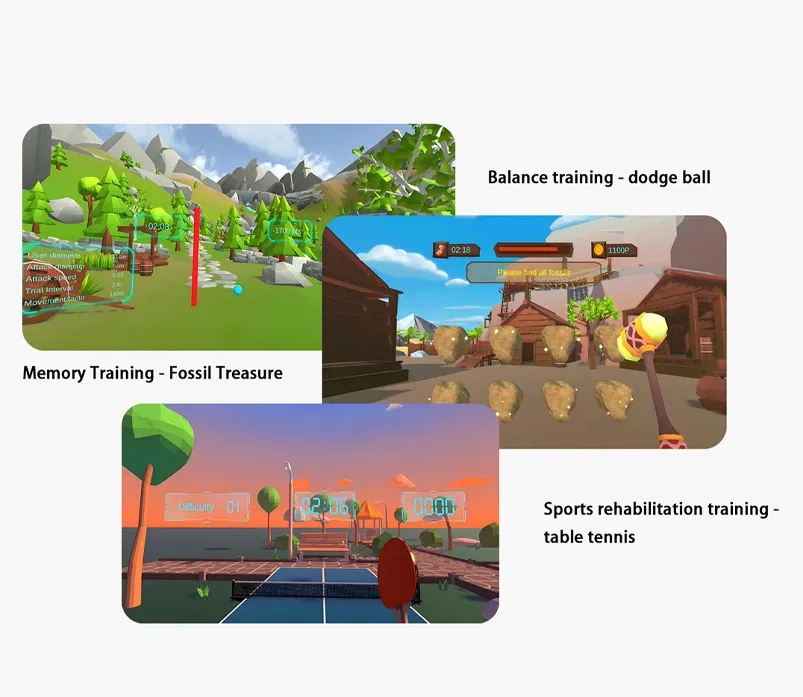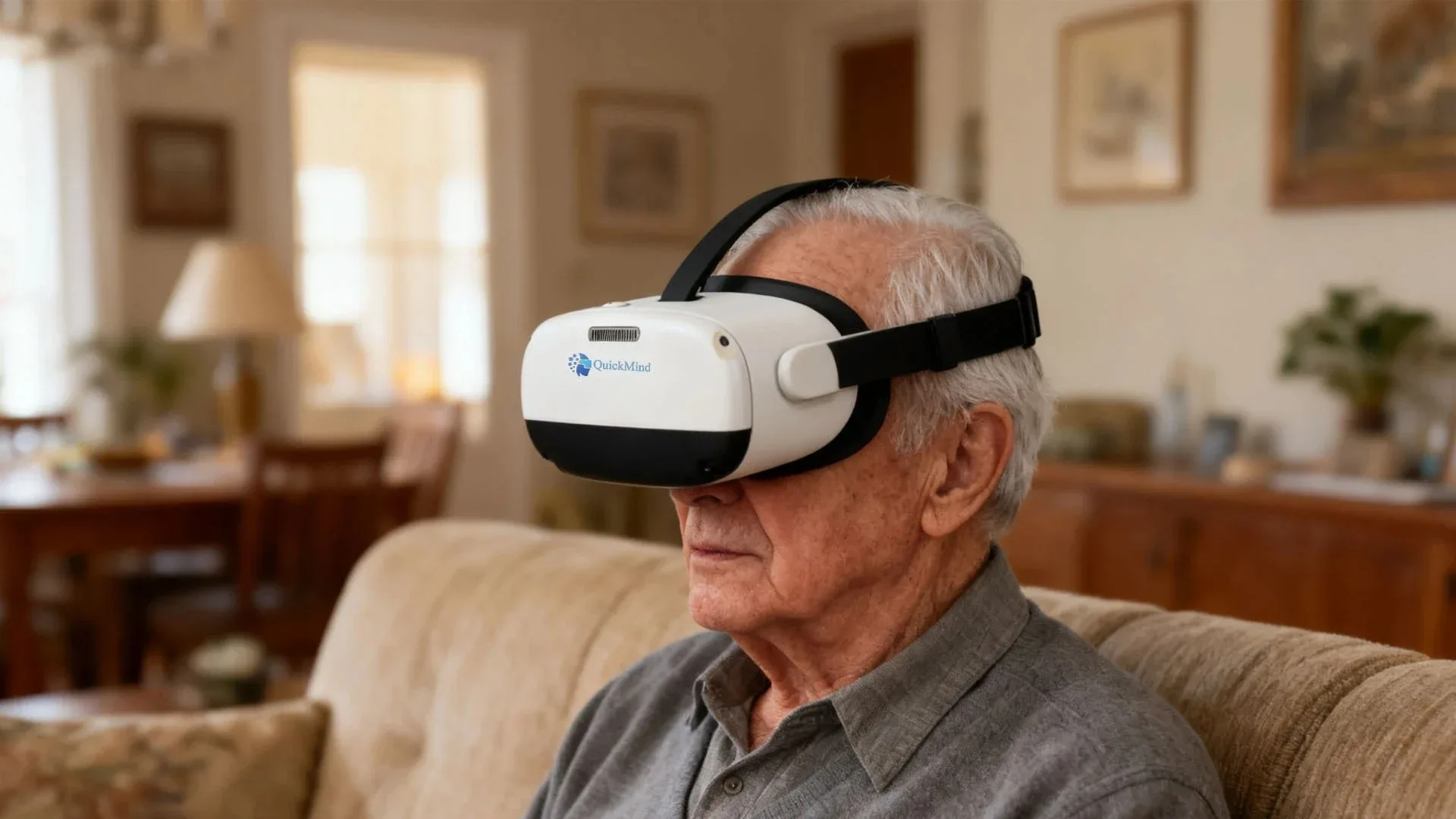
Progressive assessments suggests that interactive virtual spaces program can considerably augment the welfare of individuals dealing with cognitive decline. By transporting them to comforting backgrounds, VR delivers a unique platform for cognitive stimulation, affective stabilization, and socialization. Multiple analyses have revealed that VR therapy can minimize anxiety states, stress, and despondency in dementia users while also improving their recollection, focus, and verbal abilities.
- VR permits subjects with dementia to reexperience esteemed pasts through participative animations.
- Moreover, it can grant a safe and helpful space for social contact, fostering a feeling of affiliation and belonging.
- Clinicians propose that VR therapy has the likelihood to revolutionize dementia treatment by giving new and groundbreaking strategies to resolve the complex challenges faced by persons affected by this disease.
Computerized Brain Enhancement Methods for Alzheimer's
Growing technological interventions are revealing effectiveness in the area of neural stimulation for patients affected by Alzheimer syndrome. These platforms make use of computing power to improve brain capacity and conceivably curtail the development of the disorder. Motivating exercises, personalized support, and intellectual training are some demonstrations of processes being examined in this changing discipline. While evaluations are ongoing, digital therapeutics furnish a additional route for augmenting the well-being of those dealing with Alzheimer's disease.Exploring Virtual Worlds: Innovative Methods for Alzheimer's Care
Involving users experiencing Alzheimer's disease, the ongoing weakening of brain power and mental competence can considerably weaken their ability to participate with the surrounding environment. This crippling malady often elicits in solitude, frustration, and a limited self-concept. Fresh improvements in virtual reality technology provide a innovative chance to handle these difficulties by creating immersive atmospheres that can enhance the brain and rekindle cognitive function.
Virtual scenario worlds formed specifically for Alzheimer's clients can immerse them in known venues, such as their first house or a well-liked park area, triggering positive memories and easing anxiety. Through interactive missions, these virtual scapes can also stimulate cognitive abilities like retention, alertness, and reasoning.
The positive effects of virtual reality in Alzheimer's management are extensive. Early tests have established positive results, with participants displaying improvements in cognitive capacity, mood, and overall quality of life. As this system expands, it holds the key to modifying the way we approach Alzheimer's disease, making available a new pathway for intervention and motivation.
Immersive Reminiscence Sessions in Alzheimer's
Reminiscence therapy is a widely recognized technique used to advance cognitive function and psychological wellness in individuals with Alzheimer's disease. This established form of therapy involves inviting patients to narrate past experiences, often through discussion. However, a cutting-edge approach is emerging: VR-mediated reminiscence therapy.
This immersive technique utilizes virtual reality headsets to transfer patients in convincing environments that invoke memories from their past. By re-experiencing these constructed realities, individuals with Alzheimer's can bond with their past in a noteworthy way.
VR's Promise for Dementia Care: Enhancing Memory and Cognition
Virtual reality (VR) is emerging as a hopeful resource in the fight against dementia, supplying modern ways to activate memory and cognition. By generating immersive settings, VR can guide individuals with dementia retrieve memories, participate in meaningful activities, and augment cognitive capacities. Studies have revealed that VR interventions can cause marked improvements in memory recall, attention, and locational awareness. Moreover, VR provides a harmless and uplifting space for individuals with dementia to communicate, reducing feelings of isolation and anxiety.
- Besides, VR can be customized to individual needs and preferences, helping improved levels of collaboration.
- Despite the opportunities of VR, further research is needed to fully understand its long-term benefits in dementia care.
Reviving Recollections, Restoring Bonds: VR's Influence on Alzheimer's Social Interaction
Artificial digital experiences is emerging as a trailblazing resource in the area of cognitive disorders. By designing immersive and interactive environments, VR has the capacity to renew memories, build social interaction, and enhance the overall quality of life for people managing Alzheimer's. Prominently an influential aspects of VR is its ability to take users to nostalgic environments and adventures from their past. Whether it's a exploration of a childhood home or a depiction of a beloved holiday, these virtual escapades can recall happy memories and improve cognitive skills. Furthermore, Cognitive Rehabilitation VR can support social interaction by joining individuals with others who share similar memories. This can be particularly rewarding for people with Alzheimer's who may experience challenges with traditional social engagement. By maintaining a safe and captivating virtual space, VR can soothe feelings of isolation and loneliness, which are common among individuals experiencing Alzheimer's. Overall, VR holds immense likelihood for innovating the lives of users with Alzheimer's by restoring memories, rebuilding connections, and advancing their quality of life. As technology progresses to grow, we can expect even more groundbreaking applications of VR in the field of dementia care.Gamifying Cognitive Training: Utilizing VR for Alzheimer's Symptom Management
Digital virtual environments is rapidly emerging as a disruptive tool in the realm of cognitive training, particularly for users experiencing Alzheimer's disease. By immersing patients in interactive and engaging virtual environments, VR-based interventions can augment cognitive functions such as memory, attention, and problem-solving. These games frequently incorporate elements of storytelling, exploration, and social interaction, making the training process greatly immersive. Studies have shown that VR-based cognitive training can lead to considerable improvements in cognitive performance, conceivably delaying the progression of Alzheimer's symptoms. Moreover, VR provides a safe and controlled environment for patients to practice new skills and cultivate their confidence.
- Play-based techniques in VR training can make it exceptionally compelling and amusing for clients with brain function issues.
- VR simulations can offer true-to-life scenarios that spur and energize cognitive functions.
- Personalized VR experiences can cater to individual needs and learning styles.
Virtual Reality as a Renewed Opportunity for Dementia Patients
Immersive VR experiences offer a novel and encouraging avenue for users with cognitive impairments. These systems can reproduce familiar environments, allowing those affected by cognitive decline to experience cherished memories and support a sense of comfort. By easing the difficulties of dementia, VR worlds have the promise to advance quality of life for both patients and their families.
- Research indicate that VR treatments can noticeably impact cognitive function, social well-being, and even kinetic abilities in individuals with dementia.
- Moreover, VR affords a safe and supportive environment for interaction, reducing the risk of trauma.
- Likewise, VR can enhance social contacts by allowing individuals with dementia to communicate in digital activities with others.
Game-Changing VR Solutions for Early Alzheimer's Assessment
Alzheimer's dementia presents a complex challenge, often going undetected in its early stages. Despite this, virtual reality (VR) is gaining traction as a transformative tool for early detection. Through immersive computer-generated settings, VR can examine cognitive skills in ways that traditional methods struggle to. This promise allows for immediate action strategies, potentially pausing disease progression and improving the quality of life for patients with Alzheimer's.
- VR cognitive tests measure recall, alertness, and positional skills in safe and regulated spaces.
- Customized virtual reality sessions assist users to involve themselves in cognition-stimulating exercises.
- VR worlds offer empathetic environments for interaction among those affected by Alzheimer's.
Enhancing Dementia Communication and Social Interaction Via VR
{In the realm of dementia care, innovative technologies are emerging to supplement the lives of patients with cognitive impairments. Virtual reality (VR) is one such system that holds immense potential for enhancing social engagement and communication in dementia care. By creating immersive and engaging virtual environments, VR can activate cognitive function, reduce behavioral issues, and ultimately improve the overall well-being of clients affected by dementia.
VR experiences focused on dementia patient engagement can range from remembering therapy sessions that return users to significant former experiences, to interactive games that promote social interaction and cognitive activation. Furthermore, VR has the ability to connect clients facing dementia with social networks, regardless of physical limitations, fostering a sense of connection.
- VR can help in reducing agitation and anxiety by providing a calming and enticing environment.
- Analyses have shown that VR interventions can lead to improvements in cognitive function, mood, and social interaction in participants with dementia.
- As technology expands in progress, we can expect even more innovative and {effective|beneficial|helpful|powerful|impactful|successful|productive|efficient
